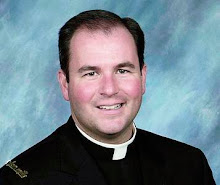
Dear friends in Christ,
Tomorrow millions of couples around the United States and beyond will be celebrating Valentine's Day. Now, it might be funny to be talking about Saint Valentine on a website dedicated to priestly vocations, but there is a connection.
I first have to admit that while I knew there was a Saint Valentine, I really had no idea about the role he played that got him on the date where couples celebrate their love. So I had to go to one of my most trusted sources, Wikipedia for some background information. From Wikipedia, I read about how in the ancient book of the saints, "The Golden Legend", Valentine was actually a priest in the Roman Empire. The story "The Golden Legend" tells is that the Emperor Claudius II made an edict, or a law forbidding young men to marry. He did this as a way to bolster his army, since he didn't consider married men to be good soldiers. Father Valentine, recognizing the importance of Christian marriage, went on a campaign to secretly marry young men and women. As a result, he was eventually thrown in jail. He was executed a few days later. This story happened in the third century after the death of Christ.
So, one can see the origins of Saint Valentine's Day to this story of a priest named Valentine who went around marrying people against the wishes of the Emperor. How far have we come from this idea of celebrating Saint Valentine's Day? The first thing is that any kind of Christian element has been taken out of the day itself. The day may celebrate love, which is a virtue in the Christian tradition, however, the "love" usually takes forms that are essentially non-Christian. For non-married couples, Valentine's Day is an excuse to engage in pre-marital sex, usually with the use of contraception. This day is also an excuse, most likely, for homosexual couple who think that what they experience is love. In both of these instances, the "love" the couple feels is a distorted and disordered love. Their idea of "love" isn't Christian love. Christian love is a beautiful union between a man and woman in holy Matrimony that is open to procreation. This Christian love is much more beautiful than any kind of distortion of love out there.
Christian love is found in every vocation God has given us, from the married life, to the priesthood and religious life. In marriage, love is fairly obvious: it is that mutual love a man and woman give each other for the sake of their sanctity. They continue to grow in love. In the priesthood and religious life, this Christian love takes the form of a non-exclusive love. Since the priest's bride is the Church, he is called to give himself to the Church in a completely loving way. In married life, the love is exclusive. For the priest, they have the benefit of their love being inclusive. They are called to love all, not in a sexual way, but in a completely Christian way nonetheless.
This points to an important aspect of the notion of love: love is a sacrifice. A man is supposed to lay down his life for his wife, and vice versa. A priest is supposed to lay down his life for his bride, the Church. Sacrifice is the ultimate notion of love. Don't let the media or popular culture tell you that love equals pleasure. This is a completely false notion of love. While it is true that Christian marriage and the marital act is pleasurable, the pleasure points to the sacrifice of each other. Sex isn't to be used as a tool for pleasure for those who are not in a marital relationship (man and woman). And those in a loving marital relationship, the marital act in which they participate would be directed to union and procreation. This doesn't mean that you can't have sex unless you are trying to get pregnant; but there must be that openness to life nontheless.
But why is sacrifice the ultimate form of Christian love? It is becase of the reality of the death of Christ. Christ says himself in the Gospel, there is no greater love than a friend giving his life for his friends. This is what Christ does on the Cross. He dies for His people, His Church so that, through His sacrifice, humanity can be saved. We celebrate this in the Eucharist. Since the priest acts in the person of Christ, that priest offers that same sacrifice for His Church. In the benediction prayer for Holy Hour, it reads: "Lord Jesus Christ, you gave us the Eucharist as the Memorial of your Suffering and Death." In the end, the love you give the people as a priest, or the love you give your husband or wife, should reflect the sacrifice of Christ on the cross.
May you remain close to the Sacred Heart of Jesus through the Immaculate Heart of Mary.
If you are reading this and think I am down on Valentine's Day, please know I am taking my fiancee to a nice dinner Saturday night for Valentine's Day, so I am not down on it; it is a great time to get together with the one you love. For those who are going out with boyfriends, girlfriends, or fiancees or spouses, I hope you have a great time, and remember real Christian love isn't getting as much pleasure as possible, but rather a reflection of the love of Christ crucified. May your actions be Christ like.
-Bobby
Tomorrow millions of couples around the United States and beyond will be celebrating Valentine's Day. Now, it might be funny to be talking about Saint Valentine on a website dedicated to priestly vocations, but there is a connection.
I first have to admit that while I knew there was a Saint Valentine, I really had no idea about the role he played that got him on the date where couples celebrate their love. So I had to go to one of my most trusted sources, Wikipedia for some background information. From Wikipedia, I read about how in the ancient book of the saints, "The Golden Legend", Valentine was actually a priest in the Roman Empire. The story "The Golden Legend" tells is that the Emperor Claudius II made an edict, or a law forbidding young men to marry. He did this as a way to bolster his army, since he didn't consider married men to be good soldiers. Father Valentine, recognizing the importance of Christian marriage, went on a campaign to secretly marry young men and women. As a result, he was eventually thrown in jail. He was executed a few days later. This story happened in the third century after the death of Christ.
So, one can see the origins of Saint Valentine's Day to this story of a priest named Valentine who went around marrying people against the wishes of the Emperor. How far have we come from this idea of celebrating Saint Valentine's Day? The first thing is that any kind of Christian element has been taken out of the day itself. The day may celebrate love, which is a virtue in the Christian tradition, however, the "love" usually takes forms that are essentially non-Christian. For non-married couples, Valentine's Day is an excuse to engage in pre-marital sex, usually with the use of contraception. This day is also an excuse, most likely, for homosexual couple who think that what they experience is love. In both of these instances, the "love" the couple feels is a distorted and disordered love. Their idea of "love" isn't Christian love. Christian love is a beautiful union between a man and woman in holy Matrimony that is open to procreation. This Christian love is much more beautiful than any kind of distortion of love out there.
Christian love is found in every vocation God has given us, from the married life, to the priesthood and religious life. In marriage, love is fairly obvious: it is that mutual love a man and woman give each other for the sake of their sanctity. They continue to grow in love. In the priesthood and religious life, this Christian love takes the form of a non-exclusive love. Since the priest's bride is the Church, he is called to give himself to the Church in a completely loving way. In married life, the love is exclusive. For the priest, they have the benefit of their love being inclusive. They are called to love all, not in a sexual way, but in a completely Christian way nonetheless.
This points to an important aspect of the notion of love: love is a sacrifice. A man is supposed to lay down his life for his wife, and vice versa. A priest is supposed to lay down his life for his bride, the Church. Sacrifice is the ultimate notion of love. Don't let the media or popular culture tell you that love equals pleasure. This is a completely false notion of love. While it is true that Christian marriage and the marital act is pleasurable, the pleasure points to the sacrifice of each other. Sex isn't to be used as a tool for pleasure for those who are not in a marital relationship (man and woman). And those in a loving marital relationship, the marital act in which they participate would be directed to union and procreation. This doesn't mean that you can't have sex unless you are trying to get pregnant; but there must be that openness to life nontheless.
But why is sacrifice the ultimate form of Christian love? It is becase of the reality of the death of Christ. Christ says himself in the Gospel, there is no greater love than a friend giving his life for his friends. This is what Christ does on the Cross. He dies for His people, His Church so that, through His sacrifice, humanity can be saved. We celebrate this in the Eucharist. Since the priest acts in the person of Christ, that priest offers that same sacrifice for His Church. In the benediction prayer for Holy Hour, it reads: "Lord Jesus Christ, you gave us the Eucharist as the Memorial of your Suffering and Death." In the end, the love you give the people as a priest, or the love you give your husband or wife, should reflect the sacrifice of Christ on the cross.
May you remain close to the Sacred Heart of Jesus through the Immaculate Heart of Mary.
If you are reading this and think I am down on Valentine's Day, please know I am taking my fiancee to a nice dinner Saturday night for Valentine's Day, so I am not down on it; it is a great time to get together with the one you love. For those who are going out with boyfriends, girlfriends, or fiancees or spouses, I hope you have a great time, and remember real Christian love isn't getting as much pleasure as possible, but rather a reflection of the love of Christ crucified. May your actions be Christ like.
-Bobby







No comments:
Post a Comment